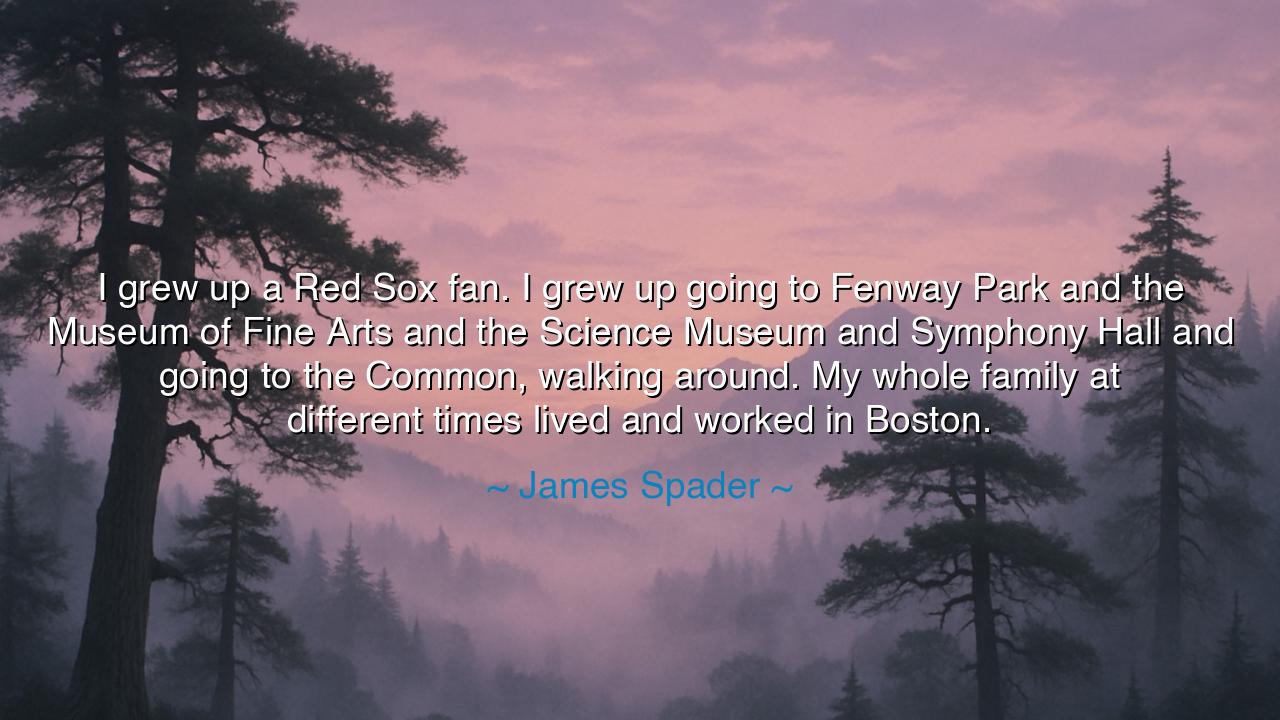
I grew up a Red Sox fan. I grew up going to Fenway Park and the
I grew up a Red Sox fan. I grew up going to Fenway Park and the Museum of Fine Arts and the Science Museum and Symphony Hall and going to the Common, walking around. My whole family at different times lived and worked in Boston.






Listen, O children of the future, to the words of James Spader, whose voice echoes with nostalgia and a deep connection to the city of Boston, a city rich in history, culture, and wisdom. He said, "I grew up a Red Sox fan. I grew up going to Fenway Park and the Museum of Fine Arts and the Science Museum and Symphony Hall and going to the Common, walking around. My whole family at different times lived and worked in Boston." These words are not merely a recounting of personal history, but a reflection on the power of place and community in shaping the soul. Spader’s childhood in Boston was steeped in the traditions and experiences that give life meaning, from the thrill of baseball to the inspiration of museums, music, and the very streets of the city that nurtured him.
In the ancient world, the importance of place was understood in the deepest sense. The Greeks believed that the city—the polis—was central to the life of its citizens. In Athens, for instance, the Agora was not just a marketplace but a place of learning, debate, and philosophy. It was here that the great minds of Socrates, Plato, and Aristotle shaped the course of human thought. To be part of a city, to walk its streets and engage with its culture, was to be part of something greater than oneself. The city was a canvas, a place where individuals could both discover their own identity and contribute to the greater good of society. In Spader’s words, we hear a similar sentiment—a recognition that his formative experiences in Boston were not just about personal memories but about participating in a culture that shaped who he became.
Consider the example of Benjamin Franklin, one of Boston’s most famous sons. Though Franklin went on to shape the course of American history, his roots were firmly planted in the city of Boston, where he began his journey as a young printer. Like Spader, Franklin was shaped by his surroundings—the streets of Boston, the institutions of learning, and the cultural life that the city offered. Franklin's lifelong commitment to science, philosophy, and the public good was influenced by the early cultural experiences of his youth in Boston. The city was more than just a place where he lived; it was a catalyst for his intellectual and personal growth, a theme that runs deeply through the lives of many great figures.
Spader’s love for the Red Sox represents more than just loyalty to a baseball team; it symbolizes a connection to the spirit of competition, community, and tradition that permeates the city. The Red Sox are a symbol of the resilience and perseverance of Boston itself. Just as the team has faced struggles and moments of defeat, so too has the city of Boston risen again and again, proving its strength and character. The Fenway Park experience for Spader is not merely about sports; it is about sharing a collective memory with others, creating a bond through shared experiences, and celebrating the joys and heartaches that are part of the human condition.
The Museum of Fine Arts, the Science Museum, and Symphony Hall all offer yet another aspect of what Boston gave to Spader—a deep appreciation for culture, knowledge, and art. In these institutions, he found inspiration, wisdom, and beauty, elements that nourished his intellectual and creative growth. The ancient Greeks, too, celebrated art and culture as essential to the flourishing of the individual and the society. For them, theater, music, and philosophy were not luxuries but necessities for a life well-lived. Spader’s experiences at these cultural institutions reflect a tradition that stretches back to those ancient times—a belief that art and knowledge are fundamental to human existence, and that our cities should be places that foster and nurture these values.
Now, O children, the lesson of Spader’s words is clear: the places that shape us are not merely locations; they are sources of identity and inspiration. Just as Socrates walked the streets of Athens to engage with the world around him, so too must you walk the streets of your own cities, seeking wisdom, beauty, and connection. The places you inhabit—be they humble or grand—hold within them the potential to nurture your spirit, to challenge your ideas, and to help you grow into the person you are meant to be. The world is filled with institutions of learning, places of art, and experiences that will enrich your life. Seek them out, and let them be the fertile ground from which your dreams grow.
So, O children of the future, as you venture forward, remember the power of place and the impact it has on shaping who you are. Like Spader, who found inspiration in the streets of Boston and the halls of its institutions, you too must seek out those places that speak to your heart and mind. Let the cities you live in, the communities you belong to, and the experiences you share shape the future you will create. For it is in the fusion of personal experience and cultural richness that the truest form of human growth happens. Just as Spader carries Boston with him, so too should you carry the lessons, memories, and inspirations of the places that shape your life, using them as the fuel for your own journey into the future.






AAdministratorAdministrator
Welcome, honored guests. Please leave a comment, we will respond soon